Dog incubators, also known as neonatal intensive care units for puppies, are crucial life-support systems for newborn pups facing health challenges. These controlled environments provide the necessary warmth, humidity, and oxygen levels to help vulnerable puppies thrive. This guide explores the various aspects of dog incubators, from understanding their purpose to choosing the right one, and ensuring proper usage for optimal puppy care.
When is a Dog Incubator Necessary?
A dog incubator becomes essential when puppies are born prematurely, experience difficulties during birth, or suffer from conditions like hypothermia, hypoglycemia, or respiratory distress. These fragile newborns require a controlled environment to support their underdeveloped systems and increase their chances of survival.  Puppy in an incubator In some cases, a mother dog might reject her litter, leaving the puppies vulnerable and in need of supplemental care. A dog incubator can provide the necessary warmth and protection in such scenarios.
Puppy in an incubator In some cases, a mother dog might reject her litter, leaving the puppies vulnerable and in need of supplemental care. A dog incubator can provide the necessary warmth and protection in such scenarios.
Choosing the Right Dog Incubator
Selecting the right dog incubator depends on several factors, including the size and number of puppies, available features, and budget. Incubators vary in size, from small units designed for individual puppies to larger ones that can accommodate entire litters. Key features to consider include temperature control, humidity regulation, oxygen supply, and ease of cleaning.
Using a Dog Incubator Effectively
Proper usage of a dog incubator is critical for ensuring puppy health and safety. Maintaining the correct temperature and humidity levels is paramount to prevent dehydration or overheating. Regular cleaning and disinfection of the incubator are also crucial to minimize the risk of infections. Monitoring the puppy’s vital signs, such as heart rate and respiration, is essential for early detection of any potential complications.
Caring for Puppies in an Incubator
Puppies requiring incubation need specialized care, including regular feeding with appropriate formula, gentle handling, and close monitoring for any signs of distress. It’s important to consult a veterinarian to determine the correct feeding schedule and amount based on the puppy’s age and weight. Providing a clean and comfortable bedding within the incubator is also essential for the puppy’s well-being. Regularly weighing the puppies and tracking their growth can help assess their progress and identify any potential issues early on.
Beyond the Incubator: Transitioning to Normal Care
As the puppies grow stronger and more stable, they can gradually transition out of the incubator. This process should be gradual, allowing the puppies to adapt to the outside environment. Initially, short periods outside the incubator can be introduced, gradually increasing the duration as the puppies become more resilient. Ensuring a warm and comfortable environment during this transition is crucial for their continued development. Close monitoring during this phase is vital to ensure a smooth and successful transition to normal care.
Conclusion
Dog incubators play a vital role in saving the lives of vulnerable puppies. Choosing the right incubator and using it correctly is paramount for ensuring optimal puppy care. By understanding the various aspects of dog incubators, breeders and pet owners can provide the best possible care for newborn puppies facing health challenges, giving them the best chance at a healthy life.
FAQ
- How long do puppies typically need to stay in an incubator? This depends on the individual puppy’s health and development, but it could range from a few days to several weeks.
- Can I make a DIY dog incubator? While possible, it’s highly recommended to use a commercially available incubator to ensure accurate temperature and humidity control.
- What are the signs that a puppy is ready to leave the incubator? A veterinarian can best assess this, but signs may include maintaining a stable body temperature, consistent weight gain, and the ability to feed independently.
- Where can I purchase a dog incubator? Dog incubators can be purchased from veterinary supply stores, online retailers, and specialized pet equipment providers.
- What is the average cost of a dog incubator? Prices vary depending on features and size, but you can expect to pay anywhere from a few hundred to several thousand dollars.
- What is the ideal temperature and humidity for a dog incubator? Consult your veterinarian, as this varies based on puppy age and condition, but a common starting point is around 90°F (32°C) and 60% humidity.
- How often should I clean a dog incubator? Daily cleaning and disinfection are crucial to prevent the spread of infection.
ILM Dog is a leading international online resource dedicated to providing expert advice on all aspects of dog care and breeding. From breed selection and puppy care to senior dog health and training, ILM Dog offers a wealth of knowledge for dog owners worldwide. We are committed to helping you provide the best possible care for your canine companion. For more expert advice and resources, contact us at [email protected] or call us at +44 20-3965-8624. Visit ILM Dog for more information on dog breeds, health, training, nutrition, grooming, and much more!